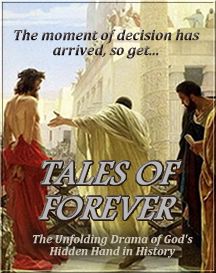About Time (Cont’d)
In the Fullness of Time
As for the time-specific element of these feast days—these appointed times of the Lord—consider this. While Passover can occur on any day of the week and Unleavened Bread starts on the following day, the Feast of First Fruits always begins on the first day of the following week. That means that the time from the beginning of Unleavened Bread, to that of First Fruits, varies from year to year. Depending on when Passover begins, then, the time from Unleavened Bread to First Fruits may last one day, two days, three days, or more. Why is that important?
To answer that, let us return our attention to that fateful day when Jesus’ brothers tried to get Him to go to Jerusalem, but Jesus refused to go because it was not His time yet. Because had Jesus obliged His brothers and gone to Jerusalem that year, or had He gone the year after next, for that matter, He could not have fulfilled the meaning of the Feast of Unleavened Bread. Why? Because as it turns out, the year that Jesus steadfastly set His face to go to Jerusalem—to die as the true Lamb of God—the time from the beginning of the Feast of Unleavened Bread, to that of First Fruits just happened to be three days and three nights. Thus, had Jesus not died the year that He did, these feast days would have failed to convey their ultimate meaning, which God intended to demonstrate to an onlooking world. But Jesus did die, “in the fullness of time,”1 just as the Scriptures tell us concerning the Advent of Christ. That means that not only did His death occur as the Pascal lambs were being slain, but His sinless body also lay hidden in the tomb for the same three-day period that Jesus predicted the Son of Man would remain in the heart of the Earth.2
Story Continues Below
Says Richard Price—the founder and CEO of Academia.edu—on his podcast In Depth With Academia:
The Book of Days: In Search of the 5,500-year Prophecy Given to Adam About the Coming of Christ is:
To hear Price’s book review of The Book of Days, CLICK HERE.
To hear Kent and Zen Garcia continue their discussion concerning the implications of the 5,500-year chronology from Adam to Christ as it pertains to the faithfulness of God, CLICK BELOW.
Story Continues From Above
And so, to anyone who looks to this marvelous correspondence between events, one cannot fail to recognize that when Jesus rose from the grave in the exact year that He did—not the year before, and not the year after—He perfectly illustrated the true meaning of both the Feast of Unleavened Bread and the Feast of First Fruits. As such, not only did Christ rise as the first fruits of the dead after three days and three nights, but we, too, can look to that first resurrection as proof of God’s promise that He will someday raise each and every one of us to newness of life.
A Long-Lost Chapter
That said, there is another time-specific promise of God, which is even more misunderstood than the preceding examples. That is because, unlike those promises found in the traditional Bible, this promise concerns a long-lost chapter of biblical history, one in which God made a primordial promise to Adam and Eve. And just like those promises concerning Daniel’s Seventy Weeks and the Feast Days of the Lord, this little-known promise has everything to do with time.
In 1882, a British biblical scholar and linguist of Oriental languages, by the name of S.C. Malan, translated an ancient text and so gave the West its first glimpse of The First Book of Adam and Eve. In it we find what is certainly the first promise ever uttered by God, where He told our first parents that after five and a half days—or 5,500 years, actually—He would send One Who would come in the flesh to rescue Adam and his descendants. Now, to those who are familiar with The King James Bible, this promise clearly recalls the most foundational promise in Genesis, where it is said a descendant of Eve would one day destroy the works of the devil and restore all creation.
Of course many reading this are understandably tempted to dismiss a book like First Adam and Eve as a complete fraud. But before you do, because you insist it is not in our modern version of The Bible, first consider this. The promise in question may not be found word-for-word in the King James Version of The Bible, but there is undeniable evidence for it in The Bible quoted by the authors of The New Testament.
That is right; to those who look to the facts of biblical history, evidence for this promise is in The Septuagint Bible, which all scholars will tell you is the Greek Version of The Old Testament. Strange as it might seem to most Christians in today’s Protestant-dominated world, The Septuagint actually contains a 5,500-year genealogy from Adam to Christ, which clearly echoes the Great Five and a Half Day prophecy found in The First Book of Adam and Eve.
How tragic, then, that when First Adam and Eve should have been held in supreme reverence because of this special correspondence between it and The Septuagint, this marvelous book was relegated to the dustbin of apocryphal history. That is, it was until more and more scholars, in the wake of the discovery of The Dead Sea Scrolls, began to connect it with other sacred texts like The First Book of Enoch, eventually paving the way to restoring this ancient prophecy of “days” to its rightful place in biblical history.








